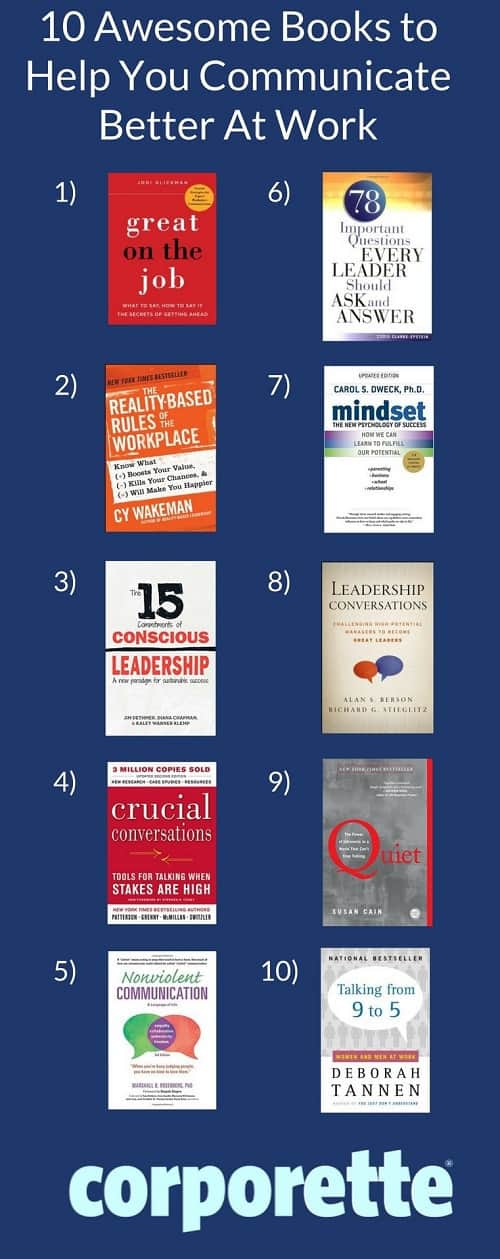This post may contain affiliate links and Corporette® may earn commissions for purchases made through links in this post. As an Amazon Associate, I earn from qualifying purchases.
 Communicating at work often requires women to walk a very fine line to avoid being seen as “aggressive,” “bitchy,” “pushy,” and so on (for exhibiting the same behavior as a typical male employee, of course). The double standard was perfectly captured by Sarah Cooper in last year's “9 Non-Threatening Leadership Strategies for Women” (which you can now buy as a poster!). Reader L recently sent us a question about how she can become a better communicator while counteracting years of being socialized as a woman to be easygoing and “go with the flow.” She asks:
Communicating at work often requires women to walk a very fine line to avoid being seen as “aggressive,” “bitchy,” “pushy,” and so on (for exhibiting the same behavior as a typical male employee, of course). The double standard was perfectly captured by Sarah Cooper in last year's “9 Non-Threatening Leadership Strategies for Women” (which you can now buy as a poster!). Reader L recently sent us a question about how she can become a better communicator while counteracting years of being socialized as a woman to be easygoing and “go with the flow.” She asks:I am a new associate at a mid-size firm and am realizing that communicating strategically is a huge weakness for me. I think a lot of this is societal (it's ingrained in me as a woman to be agreeable and not make a fuss), and based on my personality (I believe everyone is telling me the truth and I am conflict averse). I hope that I can build this skill with experience, but I'd rather learn from a book or mentor than by trial and error. What are the best books or other resources for this?We recently reached out to three women who've thought about these issues a lot and asked them to recommend helpful resources to help you become a better communicator:
 Jodi Glickman: Jodi is an entrepreneur, public speaker, and consultant in Chicago. She recommended her book, Great on the Job: What to Say, How to Say It, as well as a book she calls “a classic” for handling workplace conflict, Crucial Conversations: Tools for Talking When Stakes Are High by Kerry Patterson, Joseph Grenny, Ron McMillan, and Al Switzler. Lisa Abramson: Lisa is an executive coach and entrepreneur in the San Francisco Bay area and is co-founder of the Mindfulness Based Achievement program. She recommended Nonviolent Communication: A Language of Life by Marshall B. Rosenberg for “practical and easy to apply wisdom that can help you communicate more effectively,” as well as The 15 Commitments of Conscious Leadership: A New Paradigm for Sustainable Success by Jim Dethmer, Diana Chapman, and Kaley Klemp. Mary Anne Shew: Mary Anne is an entrepreneur and executive coach in Rochester, NY, who helps her clients with leadership development and productivity strategies. Here are the several books she recommended for Reader L (and other Corporette readers):
Jodi Glickman: Jodi is an entrepreneur, public speaker, and consultant in Chicago. She recommended her book, Great on the Job: What to Say, How to Say It, as well as a book she calls “a classic” for handling workplace conflict, Crucial Conversations: Tools for Talking When Stakes Are High by Kerry Patterson, Joseph Grenny, Ron McMillan, and Al Switzler. Lisa Abramson: Lisa is an executive coach and entrepreneur in the San Francisco Bay area and is co-founder of the Mindfulness Based Achievement program. She recommended Nonviolent Communication: A Language of Life by Marshall B. Rosenberg for “practical and easy to apply wisdom that can help you communicate more effectively,” as well as The 15 Commitments of Conscious Leadership: A New Paradigm for Sustainable Success by Jim Dethmer, Diana Chapman, and Kaley Klemp. Mary Anne Shew: Mary Anne is an entrepreneur and executive coach in Rochester, NY, who helps her clients with leadership development and productivity strategies. Here are the several books she recommended for Reader L (and other Corporette readers):- Talking from 9 to 5: Women and Men at Work by Deborah Tannen: “explores male-female communication styles in corporate and business situations.”
- Leadership Conversations: Challenging High Potential Managers to Become Great Leaders by Alan S. Berson and Richard G. Stieglitz: “does a superb job of breaking [leadership communication] into actionable steps.”
- Good Strategy/Bad Strategy: The Difference and Why It Matters by Richard Rumelt: “Learn how to craft a good strategy — for both personal and professional goals.”
- Mindset: The New Psychology of Success by Carol Dweck: “If you are having trouble getting an idea across, consider what mindset you have versus that of the others in the room.”
- The Reality-Based Rules of the Workplace: Know What Boosts Your Value, Kills Your Chances, and Will Make You Happier by Cy Wakeman: “This is the best approach I’ve seen in a long time for success at work.”
- 78 Questions Every Leader Should Ask and Answer by Chris Clarke-Epstein: “This has great questions to ask in many situations common across all sizes and types of companies.”
- Quiet: The Power of Introverts in a World That Can’t Stop Talking by Susan Cain: “The issue may not be that you are a woman but that you tend to be introverted. … Even if you feel you are extroverted, her communication ideas and advice may still help.”
- Try to ascertain your communication style with something like DiSC (which we mentioned in our recent personality tests post).
- Before a meeting or other situation in which communication is key, think about “what you want to achieve, who will be present, what they want to achieve.”
- “When you speak, ask a really great question instead of always promoting an idea … something that stops people cold, makes them sit back and look at you with wonder while they ponder what you ask.”


Ellen
The Women and Men at work (9 to 5) is a GREAT book. My dad gave this to me to read b/c he wanted to make sure I was NOT pushey (or percieved as such) by the peeople I manage at work. I think we women have to walk a fine line between being assertive on the one hand and being percieved as “bit-ch*ey” on the other hand. Personaly, I perfer to be assertive, but nice, and that is how I win my cases. I do NOT appear to be that persistent or perceptive, but then come in at the end for the kill, leaveing my prey helpless in my talon’s, the judge says. He is so cute when he rules in my favor. He told me to listen b/c ONLEY with me he bang’s the gavelle twice, rather then once when he dismisses the case (or rules in my favor). Grandma Leyeh came with me to court and she also thought the judge was cute. He is MARRIED, tho. YAY!!!!!
Minnie Beebe
To get better at going with the flow, I highly recommend taking improv classes! The book “Yes, And” is a great resource for understanding what it’s all about, and written for business-people. But taking classes will pay for itself quickly (and compared to the cost of coaching or executive training, it’s a bargain.)
Twice
In my experience, don’t speak with any confidence. Make sure you always sound unsure of yourself. It’s been my feedback that nobody likes an associate who isn’t wracked with insecurity, no matter how much experience you have or research you’ve done on the topic. I know this sounds bitterly cynical but partners responded poorly when I tried to reassure them I felt capable of handling the task and other female associates didn’t respond well that I didn’t display my insecurities on my sleeve (because I thought a professional work environment meant waiting to close the door to your office before you cry). So you’ll be caught between being disliked and being penalized. Good luck.
Anon Lawyer
I have had the complete opposite experience so it sounds like you’ve just been at a crappy firm?
I would strongly urge people to speak with confidence (not bravado) but confidence in your intellect and abilities. People are more likely to believe what you’re saying (and even listen to you) if you sound like you know what you’re talking about.
Anon
Um, what?
anon
You need to find a new employer.
Marshmallow
A+ satire.
Anonymous BigLaw Associate
This can’t be real.
Anonymous
Fake it ’til you make it. God knows others will.